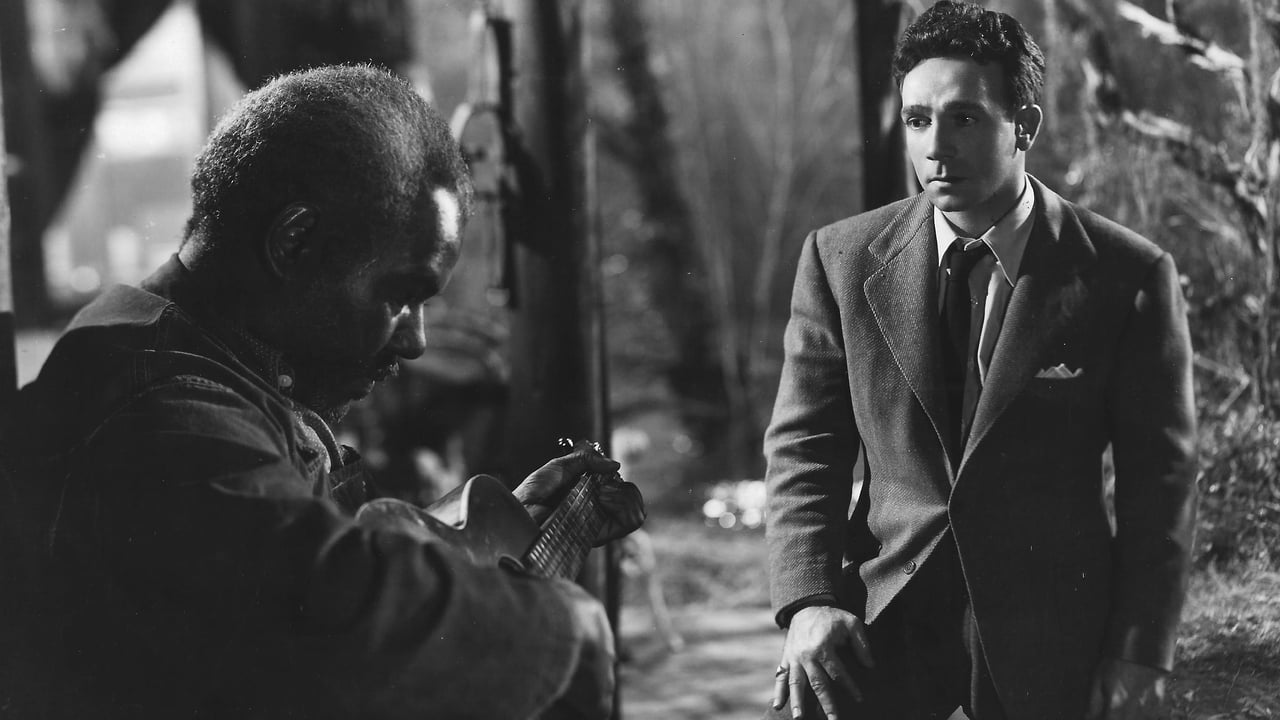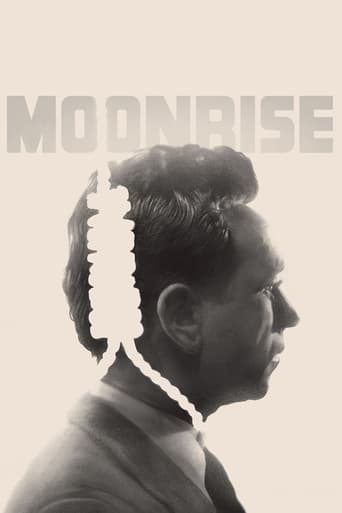RyothChatty
ridiculous rating
Inadvands
Boring, over-political, tech fuzed mess
Micah Lloyd
Excellent characters with emotional depth. My wife, daughter and granddaughter all enjoyed it...and me, too! Very good movie! You won't be disappointed.
Freeman
This film is so real. It treats its characters with so much care and sensitivity.
dw-28871
I viewed MOONRISE almost by accident on YouTube. As the movie unfolded I became drawn into the story and not only watched it to the end, but also viewed it several more times over the next few days, because the story and its characters had so grabbed my imagination. The gritty atmosphere and believable setting is convincingly brought to life on screen by the superb direction of Frank Borzage. Every character in this story is well acted and realistically portrayed. Stand out characters wonderfully brought to life are the wise all- knowing Mose (Rex Ingram); the "simple man" Sheriff Clem Otis (Allyn Joslyn), with big heart and deep understanding; the matriarch, conscience and good common sense of the Hawkins family, Grandma (Ethel Barrymore); and a sympathetic, realistic portrayal of mentally challenged deaf-mute Billy Scripture (Harry Morgan). Dane Clark, an excellent character actor I well remember from movies and TV of the 1950's, 60's and 70's, brilliantly brings troubled, tormented Danny Hawkins to life. The viewer feels Danny's inner turmoil in every subtle tightened fist, jaw clench, angry breath or glare by Dane Clark. Clark wisely underplays the drama of Danny's troubles, yet subtly keeps the inner turmoil simmering under the surface so that the viewer is constantly aware. What makes MOONRISE work, rise far above the pack, and the heart and soul of the movie, is the schoolteacher Gilly Johnson (Gail Russell). In Gilly, Gail Russell gives the audience a character they instinctively like and whose judgment the audience trusts. If Gilly sees value and worth in Danny, the audience trusts her and gives Danny another chance. Gail Russell is often described as a troubled, mediocre actress, I suspect by those who have seen very little of her work. The evidence of MOONRISE suggests Gail Russell is a very fine natural actress, with a clear star quality that makes her the center of any scene she is in, the eyes of the audience following her anytime she is on screen. As Gilly, Gail Russell creates some very touching and sweet moments: *in the ferris wheel at the fair, after Danny's story of hurt and pain as a young boy, she leans over and hugs him like a schoolteacher comforting an angry, confused, hurt little boy; *meeting Danny alone at the run-down mansion, Gilly creates a Civil War ballroom dance for her and Danny to attend; *Gilly defends and describes the real character of Danny to the Sheriff.When exploring old movies, most will be "OK, but nothing special", some will be "so bad as to forget", but at times a true gem will be uncovered. MOONRISE is such a gem. A gritty realistic tale, brilliantly directed, populated with memorable characters superbly brought to life by a superb cast. MOONRISE is a keeper, and a great story that will easily stand viewing again from time-to-time.
Robert J. Maxwell
It opens with a prisoner being hanged, dissolves to footsteps through a night-time forest, to a baby crying in the shadow of a dangling toy, to a brawl in which a gang of kids smears mud on the face of an age-mate, to a brutal fist fight between two grown men, with each blow landing with a loud THWACK on the snot locker of the other, ending with somebody's head being bashed in repeatedly with a rock. Lloyd Bridges is on screen for about 50 seconds before he becomes a corpse. Ditto, Harry Carey Jr. The sequence ends with the mangling of a borrowed car and its occupants. Don't worry, though. There's no blood. We Americans don't like violence.Gail Russell is not only beautiful and sexy, with her mane of wavy black hair and pale eyes framed by dark lashes. She's girlishly breathless and vulnerable, in real life as well as on the screen. Her character here is candid without being insulting. She's tender, empathic, nurturant, devoted to the man she loves, filled with principle and virtue, flawless in fact, just like my ex wife.But, if you ask me, she has poor taste in men. First she's hooked up with the barbaric Bridges and then, when he's hors de combat, she falls for Dane Clark, a guy whose demeanor always suggests a pustule about to pop, on top of which he's not much of an actor. The romance between Russell and Clark just doesn't click. Warners had tried setting him up as a replacement for Humphrey Bogart. What a laugh. Clark was most at home in ensembles, as in "Destination Tokyo." Speaking of amusement, the only time Dane Clark smiles in the entire movie is when he picks up a puppy and snuggles it. That suggests that inside that terrifying exterior he's really cotton candy. The only friend he has is an avuncular old black man who lives in a dilapidated bungalow on the edge of the water.Well, the question that plagues Clark is that he's a murderer in a small Virginia tidewater town and the perceptive sheriff (a nicely measured performance by Allyn Joslin) comes to suspect him. Should he run away, now that he's a murderer like his old man? Or, since it was Bridges who threw the first stone, should Clark turn himself in and plead self defense? It was produced by the notorious bonehead and cheat, Herbert J. Yates, at Republic Pictures. That means low budget. The art director has done what he could to suggest a Southern swamp but it's all obviously studio bound. But Russell's photography is very good, and the director isn't afraid to take some chances. The silhouettes, the sometimes hallucinatory dissolves, the tendency of the camera to linger on the hands of a conversant, twisting a handkerchief, tend to give the images a dreamy quality.None of that is enough to lift the movie out of the doldrums, though. It's a routine melodrama with psychological overtones. The plot is pretty sloppy. What's the deal with the knife that Clark left at the scene of the crime (a public place) and that is found later by the deaf-mute and retarded Harry Morgan? Or Henry Morgan. He couldn't seem to make up his mind about his name. He should have simply called himself H. H. Morgan. At any rate, he has the most startling moment on the screen, when Clark begins to strangle him and Morgan, without resisting, raises his eyes to the roof and opens his mouth wide, like a fish's, in a silent howl.Best exchange in the movie. Sheriff: "All I know is that there's a lot more to a human being than what you cut up down at the morgue." Coroner: "Not when they're dead."
Spikeopath
Directed by Frank Borzage and adapted from the novel by Theodore Strauss, Moonrise sees Dane Clark playing Danny Hawkins, the son of a man who was hanged for his crimes. Tormented by his father's past and bullied about it as a child, Hawkins grows into a confused and resentful man. Striking out at anyone foolish enough to cross his fractured state of mind, tragedy is quick to strike, sending Hawkins deep into the Southern mire. Can solace come in the form of Gilly Johnson? {Gail Russell} or is it simply too late to rejoin the human race?.We open with a hazy reflection that merges into the feet of walking men, men walking to the gallows as Danny Hawkins' father is hanged. The mood is well and truly set for Borzage's dreamy Film-Noir. It's something of an oddity in many ways for it most assuredly is Film-Noir, certainly in texture and on the technical issues it is, yet an overtly poetic heart and a distinctly less than broody ending almost steer it to being fanciful fluff. Borzage and his cinematographer, John L. Russell {in one of his first prominent assignments}, do wonders with the atmosphere of the piece. Set in the steamy South, shadows and darkness are a constant and rewarding part of proceedings, while swinging lights and conversations filmed at midriffs further enhance the skew whiff state of Dane Clark's protagonist. Also of note is that some scenes showcase why Borzage was rightly held in high regard back in the day, a Ferris Wheel, a car crash and a Racoon tree top sequence {that upset and engrossed me simultaneously} are just some of the reasons why this is a must see for Borzage enthusiasts.Coming as it does out of the Republic Pictures house of B moviedom, it's natural to expect some low budgetary issues. However, this is a splendid production belying its B movie worth. The cast are fine, with Clark particularly doing well as his character battles with anger and warmth issues, and the sets and location work are effective and benefit the story greatly. Thankfully, and even tho it has no restoration, the picture quality is very good, the sound mix is a bit down at times, but by and large this one has transfered well to prints being shown on British TV. With a support cast containing Ethel Barrymore, Allyn Joslyn {excellent}, Henry Morgan, Harry Carey Jr and a brief Lloyd Bridges, this is a recommended film of course. But I can't, and will not, vouch for the ending appeasing all comers. 7/10
dbdumonteil
During all his childhood ,Danny had only known ragging.Being the son of a hanged man was not easy when your school pals kept laughing at you.We can comprehend Danny's hate for Jerry Snykes ,the boy born silver spoon in hand ,whose father is a banker .The resentment had been building up for years.Not only Danny was an innocent victim ,but he also showed compassion for the half-wit,the town youth's punching bag.As grandma says,he is a good guy ,and so was his father,another unfortunate victim of fate .When Danny tries to join the human race,that is to say when he falls in love with Gilly ,it's too late: "why do you always take me far from the others?" she complains.The scene at the fair could be a respite : this is a place dear to Borzage;you may remember Margaret Sullavan on a carousel in "little man what now? " and there's a similar scene in "Liliom" .But the big wheel is also a trap.Filmed in black and white ,often in the dark,in a desperate atmosphere ,"Moonrise" is an extraordinary film noir.It nearly matched the brilliance of Borzage's precedent decade.

